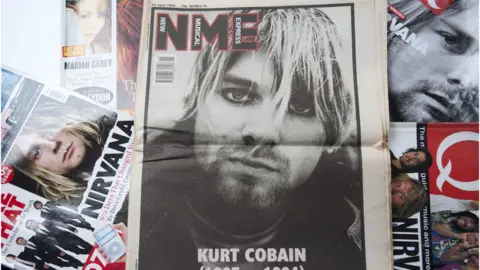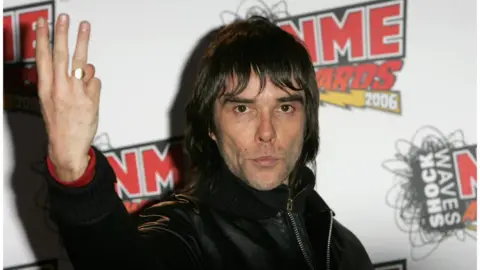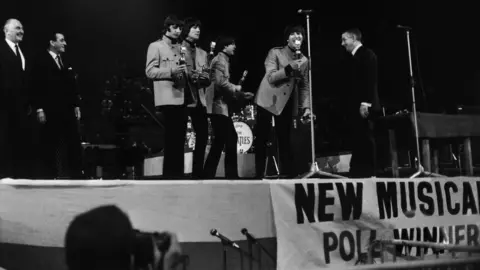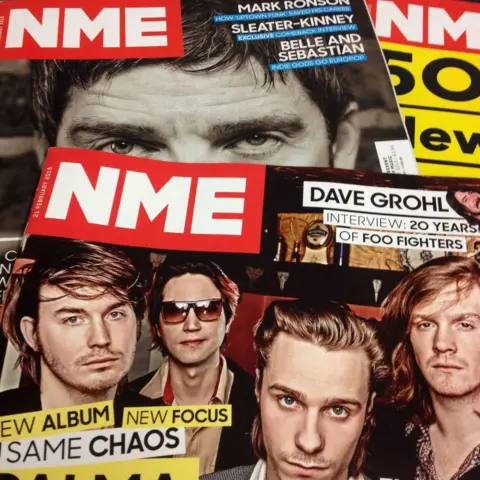NME: End of an era of excess, drugs and rock 'n' roll
 Phil Rees/REX/Shutterstock
Phil Rees/REX/ShutterstockImagine, if you can, a time before music stars either transmitted their every inane thought via social media or, depending on their PR strategy, transmitted very few thoughts at all.
Imagine a time when we got some insight into their lives from writers who were blisteringly entertaining and often as opinionated as the stars they were interviewing. When what we did know about our idols wasn't old news within half an hour. When people bought magazines.
OK, there's not much point harking back to the good old days - but the demise of the NME (yes, it's continuing digitally, but it's not the same) is the end of an era.
The New Musical Express is one of those magazines that its readers (anybody over the age of 30 and with decent taste in music) has a deep emotional attachment to.
Why? It bottled the exhilarating, kaleidoscopic, rampant music scene and brought it into our bedrooms.
Music - and those who made it - meant so much. It still does. During its heyday, music was also the most exciting expression of a youth culture that, some of the time at least, was changing British society.
The NME was a doorway to that world.
 Getty Images
Getty ImagesBefore rock music was reported in the mainstream press, before music television, and way before the internet, the NME was one of the only places to find out information about bands - or even, sometimes, to see what they looked like.
Picking up a copy from a newsagent on a Thursday, and getting ink-stained fingers as you flicked through its pages, was a ritual.
There were other music papers - like Melody Maker, Record Mirror, Sounds - which have long since fallen by the wayside. But NME was king.
As well as giving you news about musicians, its writers got close enough to the bands to give you a glimpse of their worlds. In the glory days, they would accompany them on tour for weeks on end and witness - and often partake in - the wilder side of rock 'n' roll.
 Getty Images
Getty ImagesNick Kent, one of its legendary writers, hung out with Bowie, The Rolling Stones and Iggy Pop. Kate Tyler [nee Phillips] told BBC Radio 4's The Reunion in 2007 about teaching The Sex Pistols to roll joints, and drinking pernod on a bed with Ozzy Osbourne.
Another NME great, Charles Shaar Murray, told the programme he was the fly on the wall on behalf of his readers.
"I always felt that I was in a privileged position by being on somebody's coach, being in somebody's hotel room, dressing room," he said.
"I thought, I have a quarter of a million invisible people on my shoulders here, and I'm going into this space where they can't go and it's my job to convey as much of the experience of what it is like to be here as I possibly can, so they'll feel that they're here too."
They recounted it all in a pithy, sharp, sometimes barbed style inspired by the "gonzo" journalism of the likes of Truman Capote and Hunter S Thompson.
As a result, the NME's writers were idolised almost as much as the stars they wrote about.
Julie Burchill, Danny Baker, Danny Kelly, Tony Parsons, Paul Morley, Steve Lamacq and David Quantick were among the others to make their mark in its pages.
 Edd Griffin/REX/Shutterstock
Edd Griffin/REX/ShutterstockMark Ellen, a music press stalwart, described the paper's big beasts in The Independent as "quixotic firebrands and towering egomaniacs drunk on their own power and ubiquity".
Parsons, one of the writers famously recruited through an ad asking for "hip young gunslingers", in 1976, wrote in his memoir: "We were callow and cruel and selling 250,000 copies a week. We were so successful that our owners left us alone to merrily run amok."
Rock 'n' roll behaviour took place in the NME offices as well as in the stars' dressing rooms.
Karen Walter, the editor's secretary for 34 years, told The Telegraph last year how, on her first day in the office, she saw blackened spoons in the kitchen - used for cooking up drugs.
She was told that if she wanted to make a cup of tea, she should "bring a spoon from home and lock it in your drawer".
Allow X content?
Allow X content?
Allow X content?
Allow X content?
The writers lived and breathed the music, though, and had enormous influence.
Mark Ellen wrote: "If Nick Kent penned a despatch declaring Marquee Moon by Television a masterpiece - which it was - then great swathes of the populace would believe him and buy a copy."
The paper had the ability to make the careers of those acts it championed. And while it may not have quite broken the careers of those staid stars of soft rock it had no qualms about slagging off, it made them off limits to its army of readers.
The heyday started in the rock 'n' roll boom of the 1960s, went on through the 1970s to the indie and acid house days of the '80s, and fuelled Britpop in the '90s.
It carried on into the 21st Century, but the star power and mystique of many of the artists ebbed away, and there was more restricted access, greater commercial pressure and less of a "scene" for readers to identify with.
But, for a while, as former features editor James Brown once put it: "The NME mattered."

Follow us on Facebook, on Twitter @BBCNewsEnts, or on Instagram at bbcnewsents. If you have a story suggestion email [email protected].
